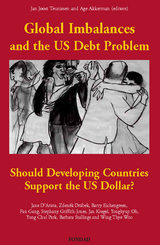Global Imbalances and the US Debt Problem: Should Developing Countries Support the US Dollar?
|
Contributing authors:
Jane D' Arista,
Zdeněk Drábek,
Barry Eichengreen,
Fan Gang,
Stephany Griffith-Jones,
Jan Kregel,
Yonghyup Oh,
Yung Chul Park,
Barbara Stallings,
Jan Joost Teunissen,
Wing Thye Woo
Editors: Jan Joost Teunissen and Age Akkerman Summary
A book that analyses how the ballooning foreign debt problem of the United States and the problem of increasing global economic imbalances are related, how these problems should be addressed and by whom. Contributing authors provide deep insights and practical policy suggestions of what can be done to lessen the vulnerability of developing countries and contribute to a resolution of the US debt and global imbalances problems. Click here for Summary in Spanish - Resumen en Español The growing and staggering foreign debt of the United States is one of the pressing issues of our days. So is the problem of large global economic imbalances. This book analyses how these two problems are related, how they should be addressed and by whom.
Quotes
“It would be nice if the United States would participate in a process of cooperative policy adjustment by addressing the domestic roots of its twin deficits. But emerging markets cannot afford to wait for the US to act.” Barry Eichengreen, University of California, Berkeley and Yung Chul Park, Seoul National University “The US dollar is no longer a stable anchor in the global financial system, nor is it likely to become one: thus it is time to look for alternatives.” Fan Gang, China Reform Foundation “It is misleading – and perhaps even dangerous – to make projections about emerging market economies as a whole. At a minimum, we need to distinguish the successful East Asian economies from others.” Barbara Stallings, Watson Institute, Brown University “A major risk for the world economy – and for developing economies – is an abrupt unwinding of global imbalances. The scale of the US deficit, its rapid growth and that of US net liabilities, make the problem an increasing source of concern.” Jane D’Arista, Financial Markets Center and Stephany Griffith-Jones, Institute of Development Studies, Sussex University “The widespread international attention on the value of the (Chinese) yuan is possibly the first time in international monetary history that the value of the currency of a developing country has so greatly exercised the finance ministries and central banks of the largest developed countries.” Wing Thye Woo, University of California and Brookings Institution Contents
Contents, Abbreviations & Notes on Contributors
1 Should Developing Countries Support the US Dollar? By Way of Introduction
2 Global Imbalances and Emerging Markets
3 Global Imbalances and Latin America: A Comment on Eichengreen and Park
4 The Dilemmas and Dangers of the Build-Up of US Debt: Proposals for Policy Responses
5 Currency Asymmetry, Global Imbalances, and Rethinking of the International Currency System
6 China’s Macroeconomic Imbalances: The Liquidity Tango Mechanism
7 How Effective Is Monetary Policy in China? A Comment on Woo’s “Inflationary Tango”
8 Asian Monetary Coordination and Global Imbalances
9 Understanding Imbalances in a Globalised International Economic System
10 Policy Recommendations for the US, Europe and Asia: By Way of Epilogue |
 € 15,-
Order now
December 2006 |










 Download Book as PDF
Download Book as PDF